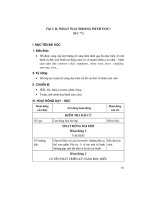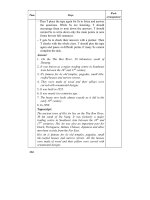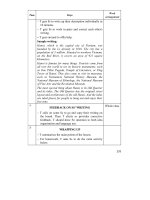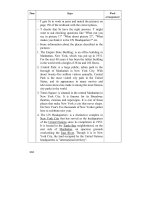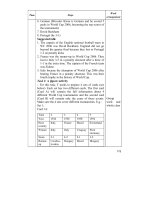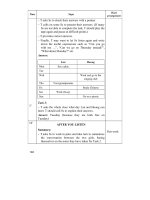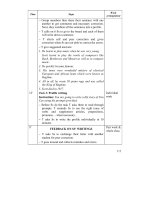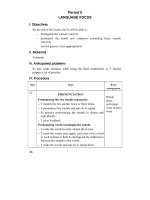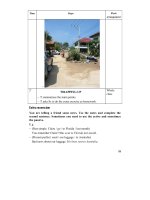Thiết kế bài giảng tiếng anh 10 tập 1 part 8 docx
Bạn đang xem bản rút gọn của tài liệu. Xem và tải ngay bản đầy đủ của tài liệu tại đây (330.97 KB, 23 trang )
162
2. Overview of current VTV channels
VTV1
• General and informative channel. The channel presents all aspects of
life including politics, economy, culture and society
• Official broadcast: September 7
th
, 1970
• Airtime: 18.5 hours/day
VTV2
• Scientific & Educational Programming. The channel targets at
students, pupils and improving community’s education. Its contents
concentrate on natural and social scientific issues and technology,
innovation information. VTV2 is planning to develop distant-learning
programmes for university level and specific sectors.
• Official broadcast: January 1
st
, 1990
• Airtime: 18 hours/day
VTV3
• Sports, entertainment and economic programming
• This is the most favorite channel in Vietnam with large genres of high
quality programmes for entertaining viewers of all ages from fantastic
international Soccer tournaments for football fans to knowledge
competition shows for students and grown-up people or games on
house work skills for housewives … The channel contributes a major
part in increasing commercial revenues for VTV.
• Official broadcast: March 31
st
, 1996
• Airtime: 18 hours/day
VTV4
• Special programming for overseas Vietnamese. The channel contents
are domestic news and information, children programmes, Vietnam -
Country - People, cultural and tourism specialized programmes. It’s
broadcast nationally in Vietnamese and English or with English
subtitles.
• Official broadcast: April 27
th
, 2000
• Airtime: 24 hours/day
163
VTV5
• Special programming for ethnic minority viewers in their dialects.
Since there are over 50 ethnic minority groups living mainly in
mountainous and remote areas, the channel is evaluated the most
effective way to connect with them and bring them information about
Government policies and events, happenings in Vietnam. By this way,
it helps narrow the gap in developments between regions in the country.
• Official broadcast: February 10
th
, 2002
• Airtime: 12 hours/day
Period 2
(Speaking)
I. Aim
Speaking about different types of the mass media
II. Objectives
By the end of the lesson, Ss will be able to talk about the differences and
similarities of some popular types of the mass media.
III. Materials
Textbook, whiteboard,…
IV. Anticipated problems
Ss may find it difficult to compare different types of mass media.
V. Procedure
Time Steps
Work
arrangement
10’
Warm-up
Noughts and Crosses
Draw a table containing 9 words in each cell.
Group work
164
Time Steps
Work
arrangement
Divide class into two groups: Noughts (O) and
Crosses (X).
Ask Ss to choose the word in the cell and make a
sentence with that word. A correct sentence with
the given word will give one O or X. The group
with 3 O or X vertically, horizontally, or even
diagonally first will be the winner.
newspaper Internet cartoon
magazine television news
radio book drama
Note: The sentences must be grammatically correct
and make sense.
Vocabulary pre-teach
orally (adv): spoken by mouth
visually (adv): seen by eyes
aurally (adv): heard by ears
Checking technique
Sentence modelling
Ask Ss to make sentences with above words. Make
sure Ss understand the meaning and the use of the
words
5’
Presentation
Ask Ss to work in pairs and decide which items are
types of the mass media.
Notice Ss to refer to the definition of the mass
media.
Pair work
165
Time Steps
Work
arrangement
Call on some pairs to explain their answers in front
of the class.
Check the answers in front of the class as a whole.
Give correct answers:
Television
Radio
Newspaper
The Internet
15’
Practice
Set the scene
You have discussed some popular types of the mass
media. As you know, each type has its own features.
Now, you work in pairs and work out what
feature(s) the types of the mass media have in
common and what main features each of them has.
Ask Ss to work in pairs and carry out the activity
using the cues in the book.
Go around the class and provide help when
necessary.
Call on some pairs to explain their answers in front
of the class.
Feedback and give suggested answers:
The mass
media
Provide/deliver information and
entertainment
The radio
provide information and entertainment
orally (through mouth)
receive information aurally (through
ears)
Pair work
166
Time Steps
Work
arrangement
Newspapers
present information and entertainment
visually (through eyes)
receive information visually (through
eyes)
Television
present information and entertainment
orally (through mouth) and visually
(through eyes)
get information aurally (through ears)
and visually (through eyes)
12’
Further practice
Have Ss work in groups and talk about different
types of the mass media.
Note: T may use the questions in the book or the
following:
Which types of the mass media do you usually get
information from?
Which one do you like most? Why?
Which type of the mass media is developing and
will develop in the future?
…
Gather ideas and have final thoughts on the topic.
Group work
3’
Wrapping
Summarise the main points.
Assign homework.
Whole class
167
Supplements
Exercise
Type of newspapers
Match the newspapers with the definitions.
A B
1. National paper a) a paper that you can buy every morning
2. Local newspaper b) a paper that’s sold throughout the country
3. Daily paper c) a paper that’s published every week
4. Weekly paper d) a paper produced in one town
Answers:
1. b 2. d
3. a 4. c
Period 3
(Listening)
I. Aim
Listening a short news edition
II. Objectives
By the end of the lesson, Ss will be able to better their ability to listen to
news editions through Gap-filling exercise.
III. Materials
Textbook, whiteboard markers, cassette,…
IV. Anticipated problems
Ss may have difficulty in understanding the news.
168
V. Procedure
Time Steps
Work
arrangement
7’
Warm-up
Guessing game
Provide three clues about the word News/
News Broadcast. Ss have to guess the word. If
Ss guess the word in the first clue, they get 30
points, 20 points in the second clue and 10 in
the third clue.
1. It is one of the radio programmes.
2. It broadcasts daily and live from radio
station.
3. It updates you with the latest
information, current affairs
domestically and internationally.
Answer:
News/ News Broadcast
Group work
5’
Before you listen
Q&A
Ask Ss to work in pairs and ask and answer the
questions:
1. How often do you listen to the radio?
2. How many hours per week do you listen
to it?
3. What programme do you like listening
to and why?
Gather ideas and introduce the listening.
News broadcast is a popular programme on the
radio. Today you will listen to a short news
edition. You listen to it and do the tasks
assigned.
Pair work
169
7’
10’
While you listen
Task 1 - Ticking the words
Explicit the items of the news. (2 items)
Ask Ss to do Task 1: Listen to the two radio
news stories and tick the right column under
News story 1 and News story 2
Play the tape once or twice.
Check the answers in front of the class as a
whole.
Give correct answers:
News story 1 News story 2
healthy √
strong √
young √
cloudy √
highest √
wonderful √
fine √
Task 2 - Gap-filling
Let Ss read the two news stories carefully and
have the guess of the missing words.
Play the tape and ask Ss to fill in the missing
words.
Notice Ss to catch the exact word(s) for each
blank.
Call on some Ss to read completed stories.
Ask for comments from other Ss.
Pause the tape when necessary.
Individual
work
Individual
work
170
8’
Feedback and give correct answers:
News story 1
1. has caused floods
2. have left their home
3. have risen
4. two metres
5. has stopped
6. cloudy
7. strong wind
News story 2
1. twenty-third
2. 4,418
3. California
4. wonderful
5. young and healthy
Task 3 – Answering Questions
Ask Ss to work in pairs and answer the
questions in the book.
Note: Ss are encouraged to do the task without
looking back to the stories on page 77.
However, Ss can look back if necessary.
Call on some Ss to read their answers aloud in
front of the class.
Feedback and give correct answers:
1. Heavy rain has caused floods all over
the country during the night.
2. Because rivers have risen.
3. The old woman has climbed Mount
Whitney twenty-three times.
4. Because it has kept her young and
Pair work
171
healthy.
Tapescript
The time is 7 o’clock and here is the news
summary.
Heavy rain during the night has caused floods
all over the country today. Many people have
left their homes because rivers have risen.
Some roads in the north-west are under two
metres of water. The rain has stopped at the
moment, but it’s still cloudy and there’s a
strong wind. Because of the bad weather
people can’t go out to work.
A ninety-year-old woman has climbed Mount
Whitney in California for the twenty-third
times. At 4418 metres, Mount Whitney is the
highest mountain in California. The woman
says the view from the top is wonderful. She
also says that the mountain has kept her young
and healthy. In spite of her old age, the woman
tries to climb the mountain very often.
5’
After you listen
Ask Ss to work in groups and use their own
words to tell other members about one of the
two news stories.
Call on some Ss to present the story in front of
the class.
Ask for comments from other Ss.
Make necessary corrections.
Group work
3’
Wrapping
Summarise the main points.
Whole class
172
Assign homework.
Supplements
Exercise
Choose the most suitable word to complete the following sentences.
1. The crop was destroyed by the
. . . . . . . . . rain last night.
a. heavy b. strong c. big d. large
2. I was late for school because
. . . . . . . . . the traffic jam.
a. on b. from c. of d. at
3. Doing exercises everyday can keep you……
a. healthful b. healthily c. health d. healthy
4. In spite
. . . . . . . . . poverty, they live happily.
a. of b. on c. over d. in
Answers:
1. a 2. c
3. d 4. a
Period 4
(Writing)
I. Aim
Writing about advantages and disadvantages
II. Objectives
By the end of the lesson, Ss will be able to write a paragraph about
advantages and disadvantages of television and other types of mass media.
III. Materials
Textbook, whiteboard markers,…
173
IV. Anticipated problems
Ss may have difficulty in finding ideas about advantages and disadvantages
for writing.
V. Procedure
Time Steps
Work
arrangement
7’
Warm-up
Sentence Race
1. Prepare a list of reviewed vocabulary words
about mass media such as newspaper,
television….
2. Write each word on two small pieces of
paper. That means writing the word twice,
once on each paper.
3. Organize the pieces like bundles, 2 bundles,
2 sets of identical words.
4. Divide the class into 2 teams. Get them to
make creative team names.
5. Distribute each list of words to both teams.
Every student on each team should have a
paper. Both teams have the same words.
6. When you call a word, 2 students should
stand up, one from each team. The students
must then run to the blackboard and race to
write a sentence using their word.
The winner is the one with a correct and clearly
written sentence.
Whole class
5’
Presentation
Implicit the meaning of advantage and
disadvantage by analysing the examples:
Whole class
174
Television helps us to learn more about the world.
Television makes us passive.
Which sentence says good about television? Which
one is bad?
Ask Ss to read about the advantages and
disadvantages of television.
Have Ss underline the key words of each idea.
Go around the class and provide help when
necessary.
Make sure Ss understand all the advantages and
disadvantages mentioned in the book
13’
Practice
Ask Ss to work in pairs and discuss the advantages
and disadvantages of the mass media and write
them down in the column.
Let Ss choose of the three types of mass media to
discuss.
Encourage Ss to find the ideas related to the topics.
Ask Ss to share the ideas with other pairs.
Pair work
Give suggested answers:
Radio
Advantages Disadvantages
It provides you hourly -
updated news and
information.
It is convenient because
you can listen to it almost
everywhere.
It makes our life easier
It only provides
information aurally.
It can be boring because
we can’t watch films or
sports programmes.
175
and enjoyable. It also
releases stress.
….
Newspapers
It provides news and
current affairs updatedly.
It’s very mobile because
we can bring them along
everywhere we go.
It’s cheap. A Vietnamese
daily newspaper costs only
approximately 2000 VND.
….
It’s less updated than other
kinds of media as there is
no more information until
the next edition.
The texts and pictures are
not moving so it is as not
exciting as other kinds of
media which have vivid
pictures and live
broadcasts.
It may not be available
everywhere due to bad
condition of transportation
The Internet
It is a rich source of
information. We can
access to Internet and get
all the information we
need. This is impossible
for other types of media
like radio or TV.
It is great tool of
entertainment. We can
play games and listen to
music online with great
pleasure.
It is a very good way to
study. We can register for
It makes us confused
when there is too much
information. Thus, it is
difficult to find the
necessary information.
It may bring bad effects
on children as it contain
“unhealthy” websites
such as sex or violence.
It damages our health due
to prolonged and
inappropriate use.
176
online courses and study
with the help of modern
aids such as speakers,
keyboard,…
15’
Further practice
Ask Ss to write a paragraph about the advantages
and disadvantages of one of the mass media
discussed in Task 2.
Let Ss work independently and write under time
pressure.
Introduce peer correction if time allowed.
Pick up some writings to correct in front of the
class as a whole.
Give suggested writing:
Updated information, convenience and stress relief
are three major advantages that radio brings us.
Firstly, radio keeps us updated with latest
information. The news which is broadcast live
hourly helps us understand current events around
the world. Secondly, unlike other types of the mass
media, radio is easy to use. We can listen to the
radio almost everywhere with little cost and great
convenience. Lastly, radio helps us to release the
stress that we suffer from work and study. Music
and entertainment progammes on the radio are
effective ways to make us feel happy and refreshed
after a hard working day. In conclusion, radio has
a lot of advantages that make our life easier and
more enjoyable.
Individual
work
Wrapping
177
5’ Summarise the main points.
Assign homework.
Whole class
Supplements
Exercise
Which sections of a newspaper will you look in if you want to find out
about the following?
a. the football results
b. a new job
c. what is on at the theatre tonight
d. where to invest your money
e. the temperature in Hanoi
f. what happened in the South of the country
g. what a newly published book is like
Answers:
a. 5 b. 6 c. 18
d. 3 e. 17 f. 2 g. 9
News and feature
Page Sections
2 Home news
3 Business and money news
5 Sports news
17 Weather forecast
9 Book reviews
18 TV and entertainment guide
6 Employment
178
Period 5
(Language focus)
I. Aim
Distinguishing the sounds /eI/, /aI/ and /כI/
Reviewing the present perfect and using because of and in spite of
appropriately
II. Objectives
By the end of the lesson, Ss will be able to:
- pronounce the sounds /e
I/, /aI/ and /כI/ clearly and correctly.
- master the use of the present perfect tense and use because of and
in spite of appropriately.
III. Materials
Textbook, whiteboard markers,…
IV. Anticipated problems
Ss may confuse the use of because of and in spite of.
V. Procedure
Time Steps
Work
arrangement
5’
Warm-up
Categorising
Give out 10 to 15 words.
Ask Ss to work in pairs or groups and decide which
words go with since or for.
Suggested words:
1990, three months, two weeks,…
Group work
179
5’
Pronunciation
Presentation 1
Demonstrate the sounds /e
I/, /aI/ and /כI/ by
pronouncing them clearly and slowly.
Help Ss to distinguish these two sounds.
Instruct the way to pronounce:
/e
I/ has two sounds: e and I
First make the sound e. Now make it longer eee.
Then add
I. This is very short
eee
I
/a
I/ has two sounds: a and I
First practice the sound a.
This is a long sound and then add
I. This is very
short.
aaa
I
/כ
I/ has two sounds: כ and I
First practice the sound כ. Now make it longer כככ.
Then add
I. This is very short.
כככ
I
Whole class
5’
Practice 1
Play the tape and ask them to repeat.
Call on some Ss to repeat the sounds clearly in
front of the class.
Ask Ss to work in pairs and practice the sentences.
Introduce peer correction.
Go around the class and provide help if necessary.
Pair work
5’
Grammar and vocabulary
Presentation 2
Review the form and the use of the present perfect
tense.
Whole class
180
Note: Ss have been familiar with the present
perfect so ask Ss to present the form and the use of
this tense. If Ss have difficulty, let Ss answer
questions about this tense.
7’
Practice 2
Ask Ss to do exercise 1 independently: Complete
the letter, using the present perfect of the verbs in
the box.
Have Ss compare their answers with a friend.
Call on some Ss to read the letter in front of the
class.
Feedback and give correct answers:
Dear Tom,
Here I am in New York! I (1) have been here for
two weeks now and it’s very exciting.
My friend, Nancy (I met her in London in 1992) (2)
has lived in New York for seven years, so she
knows all about it. I (3) have met a lot of people
and I (4) have done all the things that tourists
usually do. I (5) have had a hot lunch in China
town. I (6) have taken a trip to the Statue of
Liberty.
I even (7) have watched a ball game on T.V!
Back on the 19
th
See you later,
Bob
Individual
work
7’
Practice 3
Ask Ss to do exercise 2 in pairs: Complete the
sentences using for, since or ago.
Note: This is probably an easy exercise so let Ss do
it orally.
Call on some Ss to read and explain their answers
in front of the class.
Individual
work
181
Give correct answers:
1. Lan and Minh have lived in Ho Chi Minh
City since 1999
2. Hoa and Quan quarreled with each other
some time ago.
3. The house is very dirty. We haven’t cleaned
it for ages.
4. We haven’t had a good meal for three
weeks.
5. Since Christmas, the weather has been quite
good.
6. They have known each other for a long time.
7. They first met a long time ago.
8. They arrived home ten minutes ago.
9. It’s two years since I last saw Quoc Anh.
10. How long is it since you last saw Linda?
3’
Presentation 3
Explain the use and the difference of because of
and in spite of
Because of shows the cause.
In spite of shows the confession.
Make sure Ss understand the difference between
because of and in spite of.
Whole class
8’
Practice 4
Have Ss do exercise 3: Complete the sentences,
using the information in the box.
Ask Ss to compare the answers and discuss them
with a friend.
Call on some Ss to read their answers aloud in front
of the class.
Make necessary corrections.
Individual
work
182
Feedback and give correct answers:
1. Because of the cold weather, we kept the
fire burning all day.
In spite o
f
the cold weather, we all wore
shorts.
2. Because of his illness, he had to cancel the
appointment.
In spite of his illness, he managed to come to
school.
3. Because of the large crowds, we could not
see what was going on.
In spite of the large crowds, there were
enough seats for everyone.
4. Because the meat shortage, everyone is
living on beans.
In spite of the meat shortage, we have
managed to get some beef.
5. Because of the bad condition of the house,
the council demolished it.
In spite of the bad condition of the house,
they enjoyed living there.
183
Unit 8
The story of my village
Period 1
(Reading)
I. Aim
Reading about the changes in the country life
II. Objectives
By the end of the lesson, Ss will be able to:
- better their reading skill through vocabulary Matching and Table
completion exercises.
- enlarge vocabulary about country life such as bumper crops, cash
crops, brick houses, straw, mud…
III. Materials
Textbook, whiteboard markers,…
Pictures about country life
IV. Anticipated problems
Ss may lack of vocabulary about country life.
V. Procedure
Time Steps
Work
arrangement
7’
Warm-up
Networks
Ask Ss to work in groups of three or four and make
a list of words related to the country.
Group work
184
The group with the longest list will be the winner.
Country
10’
Before you read
Picture description
Have Ss work in pairs and discuss the questions in
the book.
Call on some Ss to read their answers aloud in front
of the class.
Feedback and give suggested answers:
1. The farmers are harvesting the crop.
2. They are working very hard.
3. It’s a good/bumper crop.
4. Good farming methods, good varieties,
modern technology used, people work hard…
Note: T may ask other questions to make full use of
the picture. Some simpler questions may be used:
What do you see in the picture?
Who are they?
What are they using?
…
Vocabulary pre-teach
straw (n): dry cut stalks of various cereals (rơm)
Pair work
